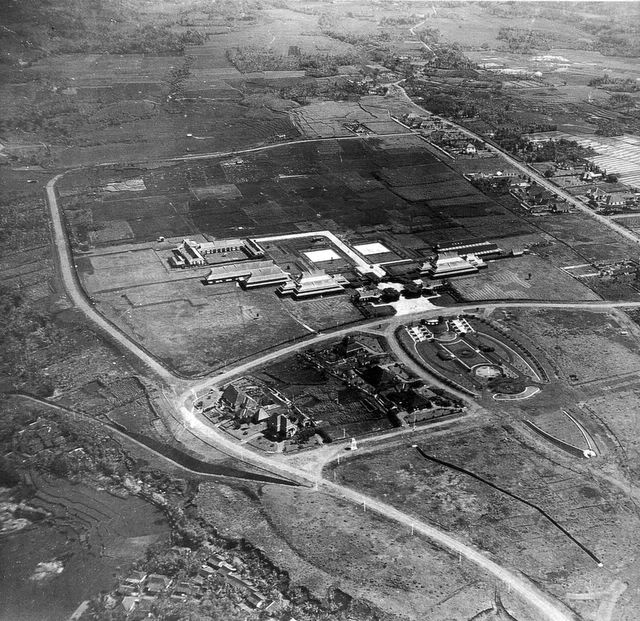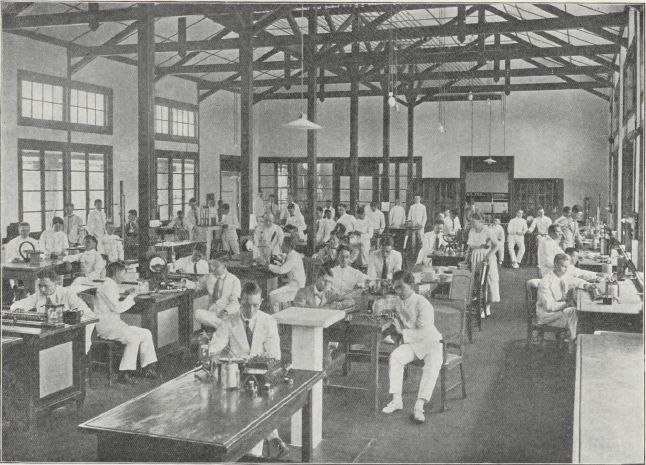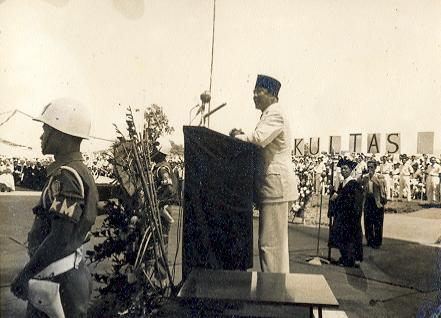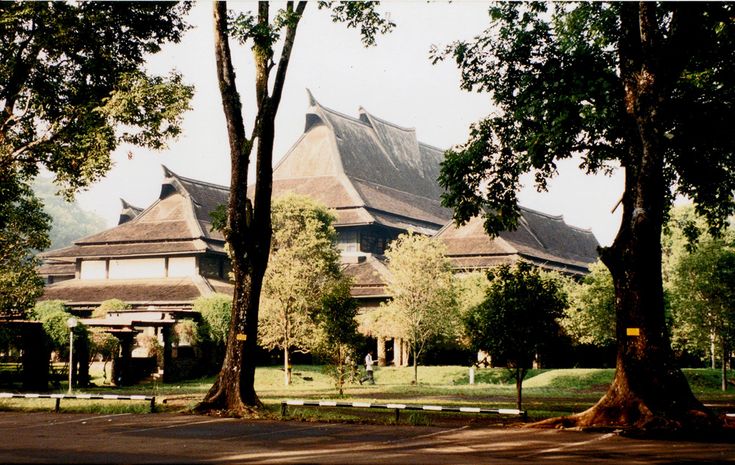Bandung Institute of Technology (ITB) is the first technical high school in Indonesia established on March 2, 1959 in West Java which carries out the mission of science and technology devotion to advance Indonesia. Born in an atmosphere full of dynamics based on the spirit of the proclamation of independence, ITB is here to optimize the development of an advanced and dignified nation.
History

The history of Technical Higher Education in Indonesia dates back to the 20th century, when the Dutch colonial government established de Techniche Hoogeschool te Bandung (TH) on July 3, 1920 on an area of 30 hectares in Bandung. At that time there was only one faculty, de Faculteit van Technische Wetenschap and only one department, de afdeeling der We gen Waterbouw. The establishment of this college was intended to meet the needs of engineering personnel who were increasingly limited in the Dutch colonial period due to the outbreak of the first World War.
Since it was officially opened for the 1920-1921 school year, 28 TH students were enrolled with only 2 Indonesians. Meanwhile, the number of lecturers at the beginning of 1922 there were 12 Professors. Four years later, on July 4, 1924, the first engineer from TH was released numbering 12 people. The status of TH from the time of opening until 1924 was bijzondere school which later changed its status from private to government agency.
On the 6th Dies on July 3, 1926, of the 22 engineer candidates who graduated there were 19 people with 4 of them were indigenous. That’s when for the first time TH Bandung produced Indonesian engineers. One of the four people was Ir. R Soekarno who later became a proclamator as well as the first president of the Republic of Indonesia.


Then during the Japanese occupation in 1944-1945, TH changed its name to Bandung Kogyo Daigaku (BKD) and became Bandung Technical College (STT) after Indonesia’s independence. Furthermore, in 1946, had moved to Yogyakarta as STT Bandung in Jogja which later became Gadjah Mada University (UGM). On 21 June 1946, there was a name change to Universiteit van Indonesie under the control of NICA with Faculteit van Technische Wetenschap and Exact Faculteit van Exacte Wetenschap established later. After that in 1950-1959 became part of the University of Indonesia for the Faculty of Engineering and the Faculty of Exact Sciences and Natural Sciences.
Driven by ideas and beliefs based on the spirit of the struggle of the proclamation of independence as well as insights into the future, the Government of Indonesia inaugurated the establishment of the Bandung Institute of Technology on March 2, 1959. In contrast to the establishment of five previous engineering colleges on the same campus, Bandung Institute of Technology was born in a dynamic atmosphere carrying out a mission of science and technology devotion, which is based on real life on earth itself for the life and development of an advanced and dignified nation.
During the first decade of the 1960s, ITB began to build and equip itself with the must-hold. In this period, preparations are carried out for the filling of organizations in the field of education and teaching, as well as completing the number and improving the ability of teaching staff with assignments to study abroad.
In the second decade of the 1970s, ITB was colored by difficult times that arose ahead of the first period. The academic unit that has been formed turns into a work unit that also serves as a socio-economic unit that is limited to semi-autonomous institutions. The level of antidechief is increasing, but the assignment of studying abroad is decreasing. Internal facilities and prejudice are increasingly being utilized.
The third decade of the 1980s was characterized by the precarry and teaching and learning process that began to enter the modern era with the physical facilities of the campus that are increasingly equipped. The number of undergraduate graduates and graduate programs began to open. This situation is supported by the improvement of socio-political and economic conditions of the country.
During the fourth decade of the 1990s, technical colleges that originally had only one department of education, now have 26 Departments of Undergraduate Programs, including the Department of Sociotechnology, 34 S2 / Master Study Programs and 3 Fields of S3 / Doctoral Studies that include elements of science, technology, art, business, and human sciences.
This decade led ITB to the dawn of a new century marked by the emergence of the best ideas and thoughts for its development. Some of them include:
- That the rapid release of information in the new century will demand the implementation of education that is accelerated, timely, integrated, sustainable, and is the best investment effort. In this effort ITB wants to uphold the undergraduate program on the foundation of mastery of solid basic sciences so that its graduates are always able to adjust to the changes that come quickly. Graduate programs spearhead the improvement of quality and quantity, efficiency and effectiveness, as well as their relevance to needs, so that ITB’s contribution to national development will be greater and higher in value.
- That the mastery and development of science and technology needs to be done in a whole and integrated, in a role as a research and development university. The development of science and technology in ITB is based on the need to support the implementation of nation-building. Thus ITB will develop itself in research and manufacturing, communication and information technology, land-sea and aerospace transportation, the environment, as well as bio-technology and biosciences.
- That the mission of community service is expected to build business insights for independence which is the initial capital to uphold college autonomy. Business insights for independence are directed to achieve the achievement of the implementation of educational and research obligations and duties as high as possible.
- That the development of ITB is expected to be based on the strength of institutions in the form of the best use of information, the maintenance of competent teaching staff, high quality of ability and service, an integrated education system, and close cooperation with the government, industry and research and education institutions at home and abroad. So that the planned development can be monitored in a sustainable and measurable manner according to the implementation of the university tridarma, human resource development, physical facilities, the practicality of norms and work procedures, as well as economic, socio-cultural and security.
- That the desire to develop ITB is reflected in the spirit and attitude of ITB that recognizes the existence of scientific truths that can be approached through observation accompanied by rational analysis. That pursuing and seeking scientific truth is the right of every human being on earth, and science and technology to be utilized as much as possible to prosper humanity, and the Indonesian nation in particular.
During the fifth decade of the 2000s, on December 26, 2000, the government through Government Regulation No. 155 of 2000 has established bandung Institute of Technology as a State-Owned Legal Entity (BHMN).
State Universities with legal entity status is something without precedent in the history of Higher Education in Indonesia. This began with the issuance of PP No. 61 of 1999 concerning the Establishment of State Universities as Legal Materials which was then followed by the issuance of PP No. 155 of 2000 concerning the Establishment of Bandung Institute of Technology into State-Owned Legal Materials. So with the issuance of PP 155, since December 26, 2000, ITB officially became a legal entity as befits other legal entities that are justified in carrying out all legal acts that do not violate applicable laws and regulations. The first consideration reviewed in PP No. 61 briefly is the existence of globalization that causes sharp competition. So to increase national competitiveness, universities are needed that can build a civil society that is democratic and able to compete globally. For that, universities, including ITB, must gain greater independence, autonomy, and responsibility. The pressure is in the process of globalization.
As of July 3, 2020, ITB is de facto 100 years old where it has produced more than 120,000 alumni who play an important role in the nation’s development, has 12 faculties / schools, 128 study programs, and 111 Expertise Groups, has 25 Centers, 7 Research Centers, and 6 Science and Technology Excellence Centers (PUI), has more than 26 thousand undergraduate, master’s, and doctoral students, has 1,510 lecturers with 195 Professors, and is located in two other places besides the Ganesa Bandung campus, namely Jatinangor and Cirebon. ITB is also the best national university and a pioneer of the advancement of science, technology, and art in Indonesia.

